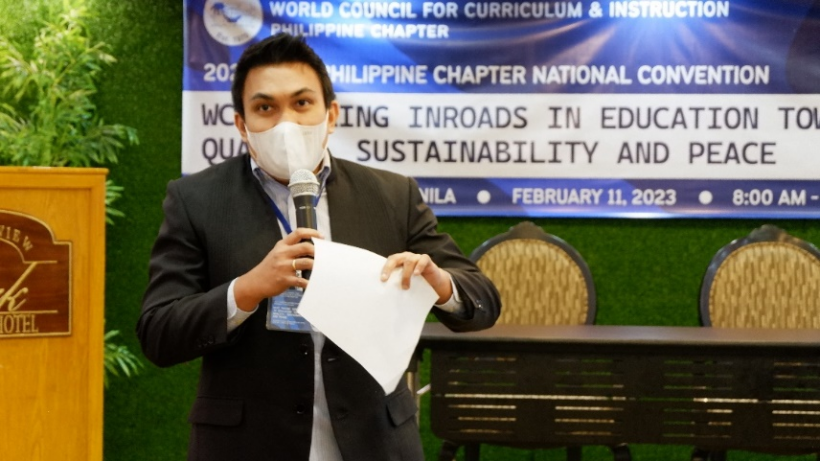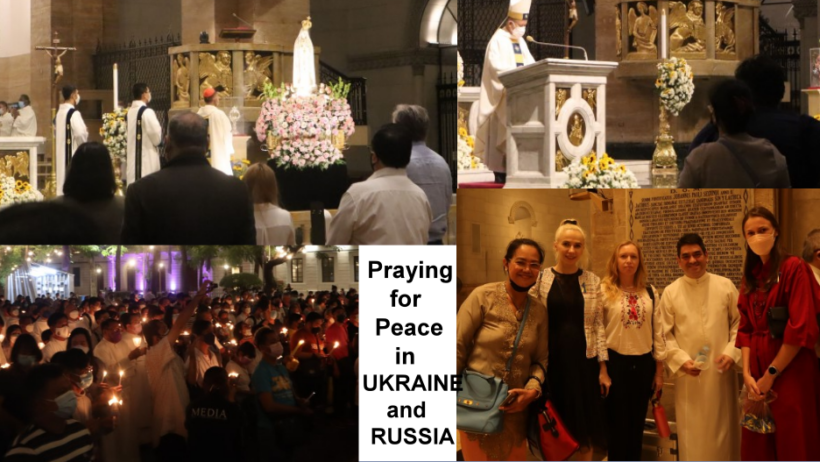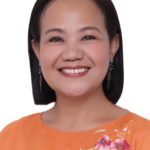by Genevieve Balance Kupang and Nico Candelario
“Our commitment to carry out the resolutions agreed upon during the Special Interest Groups (SIGs)
meetings make our WCCI organization thrive. Let us continue to truly make the SIGs the lifeblood of
WCCI.” -Dr. Genevieve Balance Kupang, WCCI Peace Educ. Coordinator
The World Council for Curriculum and Instruction Special Interest Groups (SIGs) is the lifeblood of the
organization. The SIGs provide opportunities for each member and as collectives to put plans into action. SIGs forge efforts of cooperation, and harness capability and initiative to make the capstone
projects agreed upon in the Conferences/Conventions a reality.
The SIG on Education for Sustainable Development (ESD)/Environmental Stewardship

Education for Sustainable Development (ESD) Members: Dr. Estela Maria Galang, the facilitator; Dr. Allan Peejay Lappay, Ms. Weenalei Fajardo, Sir Randolf Gavina, Ms. Imelda Leochico, Ms. Debbie Antonio Acab, Sir Nimrod Juyad, Ms. Monette Baccay, Sir Ehdie Rima, Sir Jeric Atillano, Dr. Remedios Abijan, and Ms. Ma. Belen Lim.
 Mr. Nimrod Juyad reports on the ESD table discussion.
Mr. Nimrod Juyad reports on the ESD table discussion.
This is the summary of their report:
1.) Developing Curriculum – incorporating environmental education into the school curriculum at all
levels. This includes lessons on conservation, sustainable living, and the interdependence of human
and natural systems. Examples are conducting a forum facilitated by students, infographic making, Titok
dance challenges with a focus on sustainable ecology, among others.
2.) Community Outreach – organizing community events, workshops, and educational programs that
raise awareness about environmental issues and encourage sustainable behavior.
3.) Partnering with Environmental Organizations – collaborating with local and national environmental
organizations to bring in experts and resources for ESD.
4.) Utilizing Technology – developing online educational resources and utilizing technology to reach a
wider audience and provide engaging learning experiences.
5.) Field Trips and Outdoor Activities – organizing field trips to natural areas, parks, and wildlife
sanctuaries to give learners hands-on learning experiences and increase their appreciation for the natural world, as well as conservation efforts.
6.) Encouraging Green Behavior – encouraging students, teachers, and staff to adopt environmentally-
friendly behavior, such as recycling, conserving energy and reducing waste.
7.) Engaging Parents and Guardians – involving parents and guardians in ESD by providing them with
resources and opportunities to learn and get involved.
8.) Measuring Success – regularly assessing and evaluating the effectiveness of ESD programs and
making adjustments as needed to ensure maximum impact.
Implementing these action plans can help create a culture of environmental awareness and
sustainability, and equip future generations with the knowledge and skills needed to address
environmental challenges.
The SIG on Peace Education

Peace Education Members: Seated fr. L: Dr. Violeta Jerusalem, Dr. Angelito Cortez, Jr., Dr. Jennifer Capistrano, Retired PNP, Ed Villamayor. Standing fr. L: Dr. Encarnacion Abinal, Dr. Genevieve Balance Kupang, Ms. Karen Evardo, Mr. Nico Candelario, and Miranimfa Medianista. 3rd Row: Dr. Theresa Cardano and Dr. Teresita Capacete.
Among the Peace Education members, there is a conscious implementation of the culture of peace in
the educational system, in our community engagements, and within ourselves. The incorporation of
peace education, respect for human rights, and global citizenship in the core mission and processes of
learning in the school’s formal and informal platforms, synchronous, asynchronous, hybrid, and lifelong
learning is a commitment we undertake.
Dr. Angelito Cortez, Jr. and Dr. Jennifer Capistrano of the Department of Education Central Office
shared the Madrasah Education Program (MEP), “providing Muslim learners with appropriate and relevant educational opportunities while recognizing their cultural contexts. MEP integrates content and competencies which are relevant and of interest to Muslim learners,” Dr. Violeta Jersusalem talked about how important mental health is in peace education. Mental health is also a social justice issue because it has implications both on the personal and communal levels. Sir Ed Villamayor from Bukidnon, Mindanao expressed that another approach to peace education is the learners’ and communities’ participation in organic, diversified, and sustainable farming. He pointed out that one of the reasons for conflicts is the lack of access to basic necessities like food. Thus, agricultural education can also serve as a peace education program.

Peace-building efforts through volunteer work among the deprived sectors of society. Ms. Miranimfa Medianista with the partner-beneficiaries.
Ms. Miranimfa Medianista also shared her outreach programs in the disadvantaged area in Roxas
Boulevard, Metro Manila, and discussed how important these programs are to peace education. This sharing of experiences and insights underscores the importance of education in peacebuilding. Learning from nature, Dr. Kupang, expressed that a productive tree never ceases to bear fruits even in the hardest of seasons. As the SIG chair, and Peace Educ. Coordinator, she shared accomplishments during the pandemic:
1) Planting of the peace pole at the Iyaman Homestay in Bila, Bauko, Mountain Province and the giving of peace message during the Peace Pole Dedication Ceremony held in La Salle Academy, Iligan.
2) Participation during the Lingap-Canada celebration of the 2021 World Environment Day. She wrote an article dubbed “Stop Environmental Plunder, Start Ecosystem Restoration.
3) A peace article “In Gratitude To Thich Nhat Hanh: The ASEAN Model of Non-Violence, The Empowered Global Peace Activist.
4) Storytelling and Book Donation in Bansa Elementary School, Bauko.
5) Co-facilitating the international conference dubbed “Religion at the Service of Fraternity (Fratelli Tutti) and Interreligious Dialogue: Seeing God in the ‘Other’ and “Engaging Moral Imagination for Co-creative Interfaith Actions.
6) Being part of the leadership team (international juror) in the 2022 Exceptional Women of Peace Award initiated by Pathways to Peace, also an NGO of the United Nations.

Ukrainians living in Manila, members of the Uniharmony Partners Manila, Fr. Richard James Babao, and WCCI Peace Educ. Coordinator Genevieve Balance Kupang join the Catholic Bishops, Clergy, Religious, and Lay Faithful in praying for peace in Ukraine and Russia.
7) Participation in calling for the withdrawal of the Russian troops on Ukrainian soil.
8) Two article contributions in the Journal of Curriculum Enrichment, WCCI Kano Branch, Nigeria Chapter through the invitation of Peace Education member Dr. Yaya Aliyu. These were “Harmony through Interreligious and Intercultural Dialogue: Highlights of a Decade of Commemorating the UN World Interfaith Harmony Week” and “Racism And The Identity Of Blackness In America.
9) Collaboration with Uniharmony Partners Manila during the 2021 World Interfaith Harmony Week dubbed “Living The Spirit of Harmony and Solidarity Amidst Covid 19 in a Wounded World.
10) Rendered inspiration message during the Artablado: Balik-TaNoW: Malabon, Noon at Ngayon” Art Exhibit.
11) Contribution to the WCCI International Newsletter: “Gifted to Give: In the Spirit of Indigenous, Jewish, Christian and Muslim Faith Traditions.
12) Participation during the panel discussion, “City of Ali: Exploring the life and legacy of Muhammad Ali.”
The SIG report on Education for Social Transformation will be shared as part three. In case you missed
the first part of this article, here is the link :https://www.pressenza.com/2023/02/ highlights-of-the-2023-world-council-for-curriculum-and-instruction-philippine-chapter-national-convention-part-1/
About the Authors:

Nico Candelario is an educator, and a human rights and peace with justice
advocate. He studied Peace and Conflict Studies at the University of Sydney as an Australian Government scholar. While in Sydney, he worked as a graduate intern for the Schools Liaison Program of the NSW Services for the Treatment and Rehabilitation of Torture and Trauma Survivors, a not-for-profit organization that provides relevant psychological treatment and support to refugees in Australia. Currently, he works as an Educational Technology Specialist for a publishing company in the Philippines and its Instructional Design Head for Social Sciences and Philosophy. He is also a lecturer, a researcher, and a consultant.

Genevieve Balance Kupang is a life member of the World Council for Curriculum and Instruction, a United Nations NGO in special consultative status with ECOSOC and UNESCO. She served WCCI as the Chair of the Special Interest Groups in the 2016 Budapest and 2018 Rome Conferences and holds the position up to the present. She was the Peace Education Coordinator (PEC) during the 2012 Taiwan, and 2014 San Diego, USA Conferences. In the Philippine Chapter, she was the Research and Publication Chair at the 2017 ASEAN Conference held in Novotel, Manila, as well as the PEC in its many fora. She is a researcher, lecturer, cultural mapper, consultant, and author.






